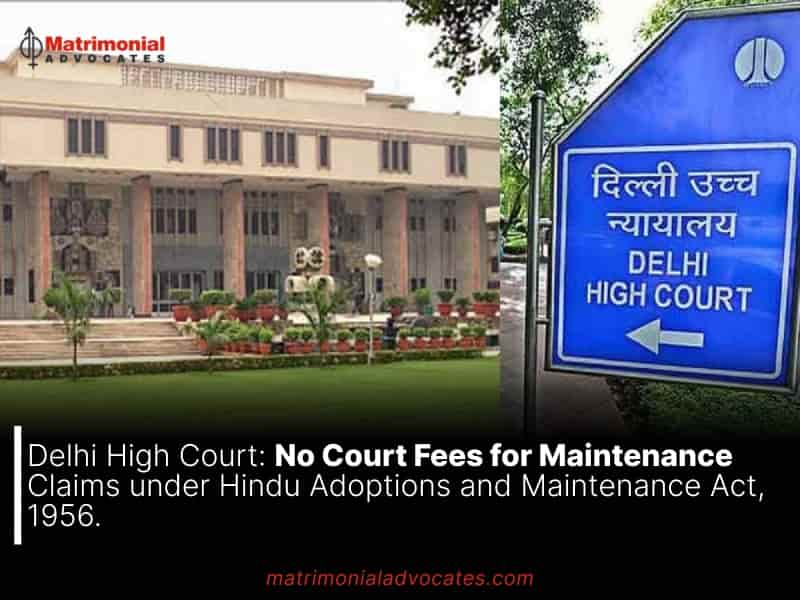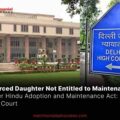
“The Family Courts Act, 1984 was enacted pursuant to the 59th Report of the Law Commission wherein it was stressed that in dealing with the disputes concerning the family, the family court should adopt an approach radically different from that adopted in ordinary civil proceedings.”
The Delhi High Court has issued a notable pronouncement addressing the issue of court fees in the context of maintenance cases governed by the Hindu Adoptions and Maintenance Act, 1956 (HAMA). The case under consideration entailed an appeal challenging a prior order issued by the Family Court in February 2020, which mandated the payment of court fees based on the claimed amount. A Division Bench, comprised of Justice Sanjeev Sachdeva and Justice Vikas Mahajan, presided over this matter.
At the core of the dispute was the determination of whether ad valorem court fees, typically contingent on the claim amount, should be levied on maintenance claims lodged under Sections 18 and 20 of HAMA. The appellants, including the spouse of the respondent (Appellant 1) and the offspring of the respondent (Appellant 2), had instituted legal proceedings pursuant to these sections of HAMA.
The Delhi High Court, in its verdict, held that the proceedings brought under Sections 18 and 20 of HAMA ought not to be categorized as conventional suits. Rather, they should be construed as sui generis legal proceedings, thereby rendering ad valorem court fees inapplicable. This judicial determination led to the overturning of the prior order promulgated in February 2020, which had necessitated the payment of ad valorem court fees.
It was emphasized by the Court that Family Courts, upon establishment by the State Government, are vested with exclusive jurisdiction over the entire spectrum of maintenance matters, encompassing actions pursuant to HAMA, the Hindu Marriage Act, 1955, the Criminal Procedure Code, 1973, and other cognate statutes. The instant case had its genesis in the Family Court, and it was underscored that a Hindu wife possesses the prerogative to assert her claim for maintenance under diverse sections of various legal frameworks.
Furthermore, the Court expounded upon the inequity and irrationality inherent in imposing disparate fee structures for maintenance claims contingent on the specific legal framework invoked. In consequence, it was adjudicated that a uniform approach to court fees was imperative. The Court invoked precedent, including cases such as “Mamta v. Hari Kishan” and “Balwinder Singh v. Sinderpal Kaur,” which had previously established that Family Court proceedings should not be characterized as conventional suits and ad valorem court fees should not be imposed.
In summation, the Delhi High Court concluded that the Family Court had misconstrued the statutory provisions, and the established legal precedents should govern. Consequently, maintenance proceedings under HAMA were deemed exempt from the conventional ad valorem court fees, thus ensuring coherence and equitability in the administration of court fees in the context of maintenance claims.
The Court opined that “in Mamta case (supra) and Balwinder Singh case (supra) the ratio is that the object of the Family Courts Act, 1984 was to set up a forum for settlement of family disputes with due emphasis on conciliation and achieving socially desirable results and further to eliminate the rigid rules of procedure and evidence.”
The Court determined that the enactment of the Family Courts Act, 1984 (‘the FC Act’) was a legislative response to the recommendations articulated in the 59th Report of the Law Commission. The primary intent behind the FC Act was the simplification of evidentiary and procedural norms within the ambit of family law, with a view to enhancing the efficacy of Family Courts.
In alignment with this legal perspective, the Court invoked the judicial precedents of Karbhari Vithoba v. Anusuya Karbhari 1956 SCC OnLine Bom 97 and Srikant Chand v. Mt. Ram Mohini 1957 SCC OnLine Pat 234. The Court, in its judicial wisdom, pronounced that proceedings governed by Sections 18 and 20 of the Hindu Adoption and Maintenance Act (HAMA) do not attain the character of conventional suits. Rather, they qualify as unique proceedings to which a prescribed fixed court fee of Re. 1.25p is applicable, thereby exempting them from ad valorem court fee assessment.
Consequently, the Court, exercising its adjudicatory authority, annulled the order dated 22-02-2020.





